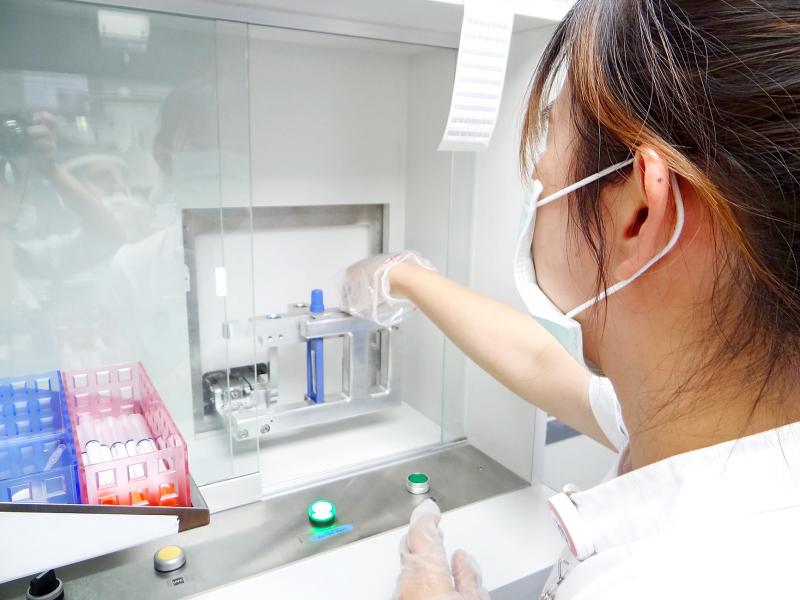Kim Forest Enterprise Co (金萬林), which focuses on molecular testing, yesterday reported that revenue last month doubled from a year earlier to a record NT$54.04 million (US$1.95 million) as domestic demand for COVID-19 testing rose amid an outbreak in Taiwan.
Almost half of the revenue was generated by a laboratory established to assist hospitals in Taipei with COVID-19 testing, as hospitals did not have enough staff to handle the rising number of polymerase chain reaction (PCR) tests, Kim Forest spokesman Vincent Yang (楊文明) told the Taipei Times by telephone.
Although samples must be collected by doctors or nurses, as the invasive process requires a long swab to be inserted into the subject’s nasal cavity, laboratory technologists can conduct certain steps including extracting samples and testing, Yang said.

Photo courtesy of Chi Mei Medical Center
As Kim Forest produces test kits for SARS-CoV-2 — which causes COVID-19 — supplies its own PCR machines and is an agent for foreign-made PCR machines, its labs have ample capacity to facilitate testing, he said.
“We can analyze up to 10,000 samples a day, which is more than is needed, as the maximum number of samples collected in Taipei in a day is about 2,000,” Yang said.
Kim Forest’s labs have worked with the government’s COVID-19 testing program and several private companies that paid to have their employees tested, with help from hospitals, he said.
Although the lab entity is not a company, Kim Forest owns it, so could still recognize the revenue into its consolidated figures, he said.
Twenty percent of last month’s revenue was from sales of detection kits, Yang said, adding that many hospitals purchased kits from the firm, as they have been granted emergency use authorization by the US Food and Drug Administration.
Moreover, its kits can be used with many styles of diagnosis machines, he said.
“The revenue structure is different from last year, when the main source of revenue was overseas sales of PCR machines,” Yang said. “Demand for kits and testing was lower last year, as the pandemic was relatively contained in Taiwan.”
Marketing activity for Kim Forest’s PCR machines was restricted, as staff could not easily visit hospitals or schools amid a level 3 alert, Yang said.
However, the company is confident that sales would pick up this year, as the Ministry of Health and Welfare has announced a subsidy of NT$5 million for each hospital assigned as a testing location.
In the first five months of this year, Kim Forest’s cumulative revenue grew 76.43 percent annually to NT$164 million, company data showed.

SETBACK: Apple’s India iPhone push has been disrupted after Foxconn recalled hundreds of Chinese engineers, amid Beijing’s attempts to curb tech transfers Apple Inc assembly partner Hon Hai Precision Industry Co (鴻海精密), also known internationally as Foxconn Technology Group (富士康科技集團), has recalled about 300 Chinese engineers from a factory in India, the latest setback for the iPhone maker’s push to rapidly expand in the country. The extraction of Chinese workers from the factory of Yuzhan Technology (India) Private Ltd, a Hon Hai component unit, in southern Tamil Nadu state, is the second such move in a few months. The company has started flying in Taiwanese engineers to replace staff leaving, people familiar with the matter said, asking not to be named, as the

The prices of gasoline and diesel at domestic fuel stations are to rise NT$0.1 and NT$0.4 per liter this week respectively, after international crude oil prices rose last week, CPC Corp, Taiwan (台灣中油) and Formosa Petrochemical Corp (台塑石化) announced yesterday. Effective today, gasoline prices at CPC and Formosa stations are to rise to NT$27.3, NT$28.8 and NT$30.8 per liter for 92, 95 and 98-octane unleaded gasoline respectively, the companies said in separate statements. The price of premium diesel is to rise to NT$26.2 per liter at CPC stations and NT$26 at Formosa pumps, they said. The announcements came after international crude oil prices

DOLLAR SIGNS: The central bank rejected claims that the NT dollar had appreciated 10 percentage points more than the yen or the won against the greenback The New Taiwan dollar yesterday fell for a sixth day to its weakest level in three months, driven by equity-related outflows and reactions to an economics official’s exchange rate remarks. The NT dollar slid NT$0.197, or 0.65 percent, to close at NT$30.505 per US dollar, central bank data showed. The local currency has depreciated 1.97 percent so far this month, ranking as the weakest performer among Asian currencies. Dealers attributed the retreat to foreign investors wiring capital gains and dividends abroad after taking profit in local shares. They also pointed to reports that Washington might consider taking equity stakes in chipmakers, including Taiwan Semiconductor

A German company is putting used electric vehicle batteries to new use by stacking them into fridge-size units that homes and businesses can use to store their excess solar and wind energy. This week, the company Voltfang — which means “catching volts” — opened its first industrial site in Aachen, Germany, near the Belgian and Dutch borders. With about 100 staff, Voltfang says it is the biggest facility of its kind in Europe in the budding sector of refurbishing lithium-ion batteries. Its CEO David Oudsandji hopes it would help Europe’s biggest economy ween itself off fossil fuels and increasingly rely on climate-friendly renewables. While